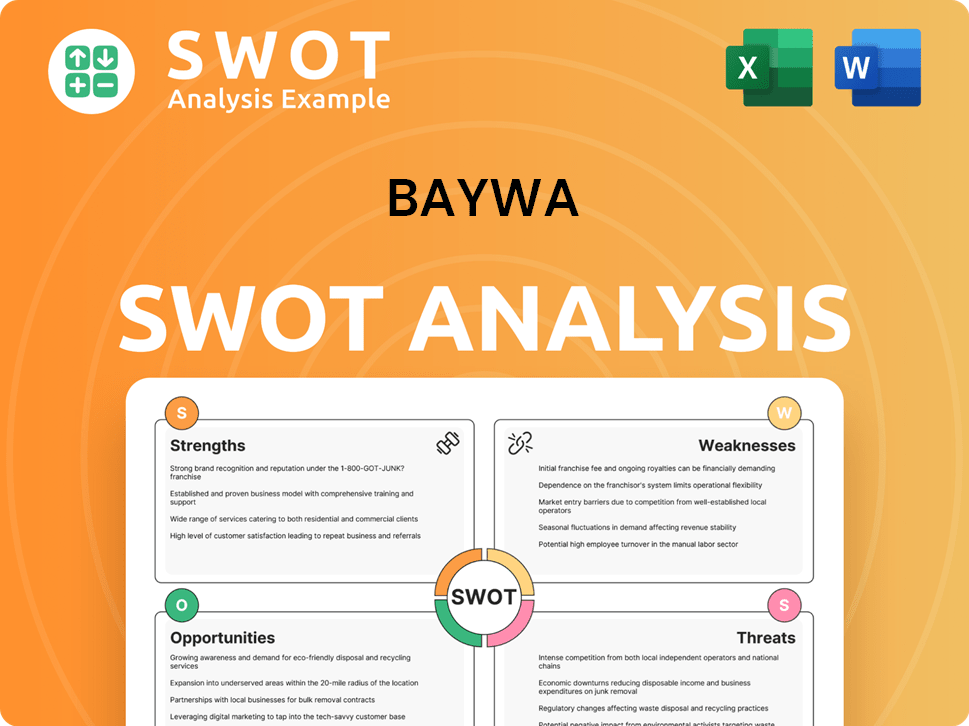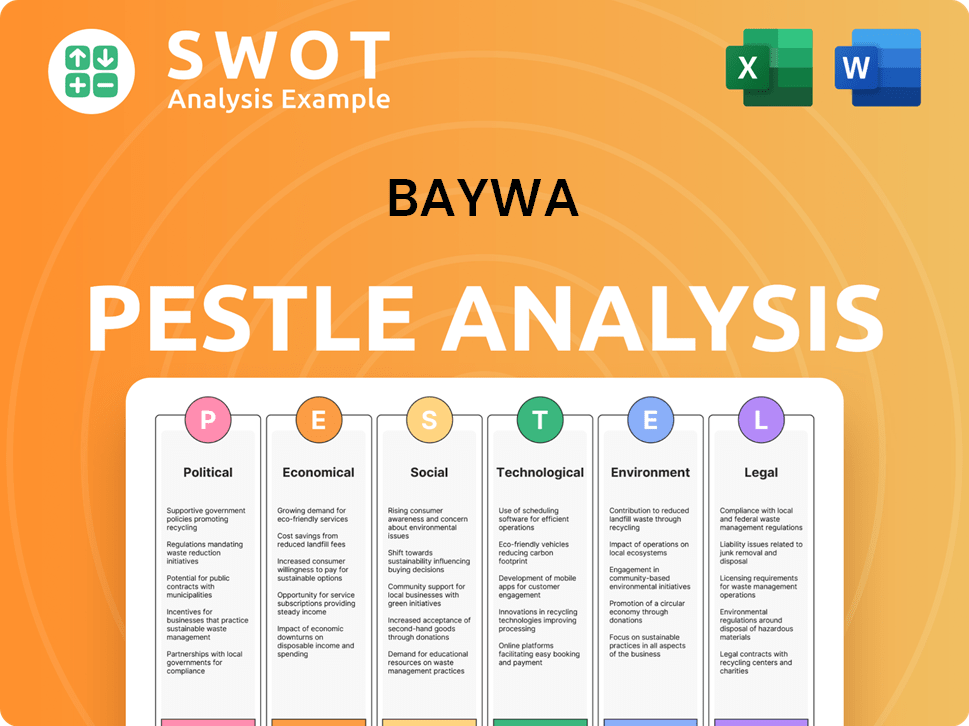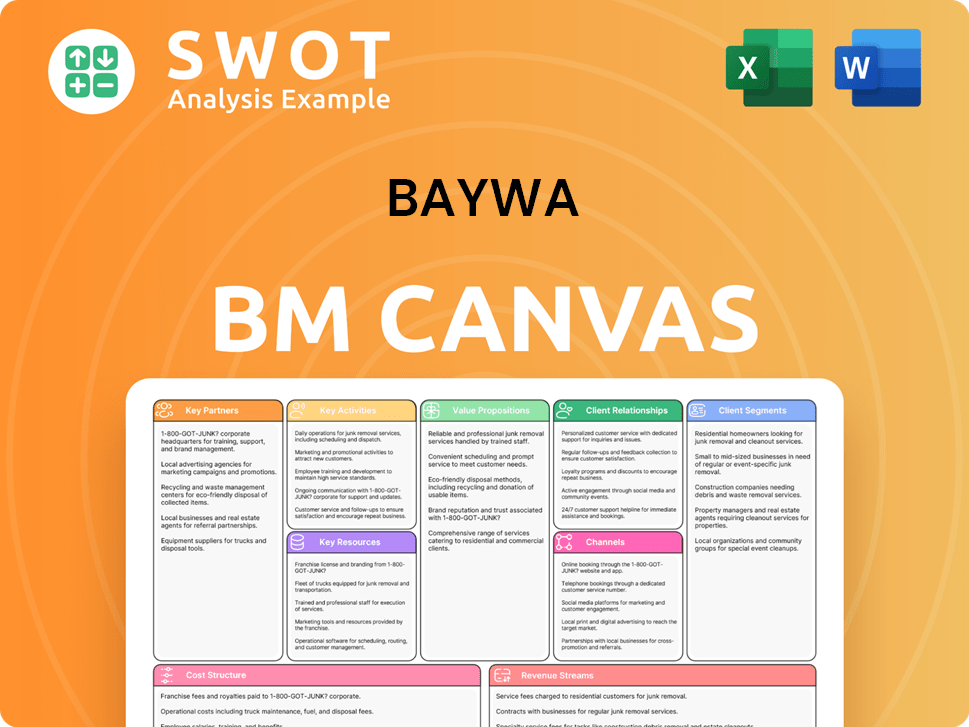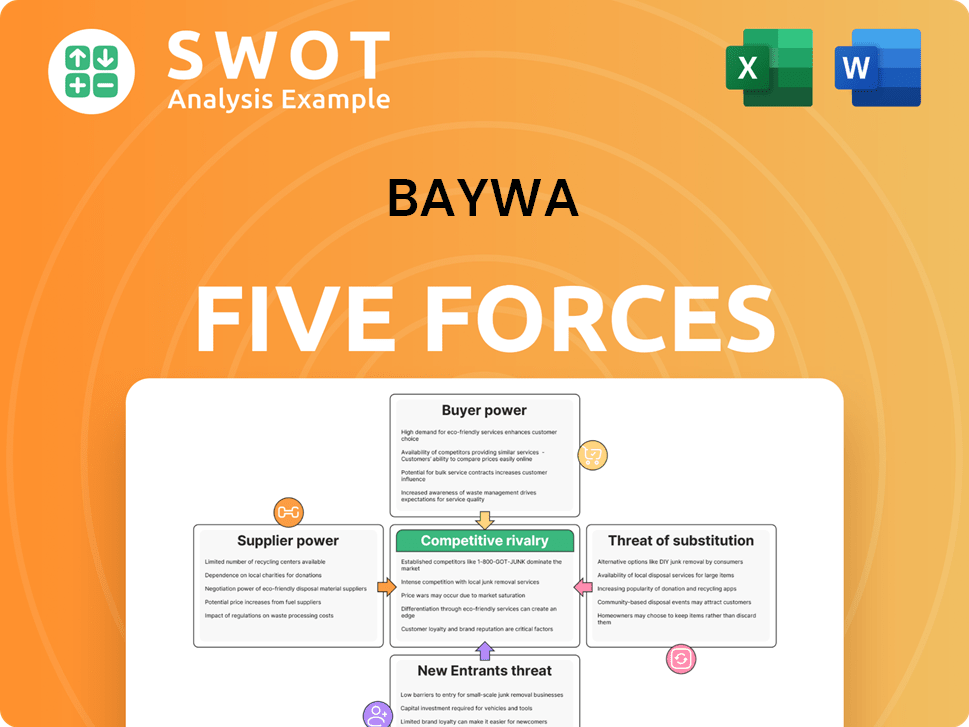BayWa Bundle
How has BayWa AG transformed since its inception?
Ever wondered how a small agricultural cooperative became a global powerhouse? The story of BayWa SWOT Analysis is a compelling narrative of strategic evolution and market adaptation. From its BayWa origins in 1923, this BayWa company has navigated economic shifts and technological advancements to become a leader in multiple sectors. Delve into the BayWa history and discover the key moments that shaped its remarkable journey.

Understanding the BayWa AG timeline provides critical insights into its business acumen. The company's early focus on BayWa agriculture laid the foundation for its future success. Exploring its BayWa business ventures and strategic expansions reveals a commitment to innovation and sustainability, making it a fascinating case study for any investor or business strategist interested in market dynamics and long-term growth.
What is the BayWa Founding Story?
The BayWa company, a prominent player in the global agricultural and energy sectors, has a rich history rooted in post-World War I Germany. The company's origins are closely tied to the needs of Bavarian farmers seeking stability in a challenging economic environment. Understanding the brief history of BayWa AG provides valuable insights into its evolution and impact.
BayWa AG was established on January 26, 1923, in Munich, Germany. Initially named Bayerische Warenvermittlung landwirtschaftlicher Genossenschaften, its founding was a direct response to the economic turmoil following World War I. The primary goal was to stabilize the supply chain for Bavarian farmers.
The founders, primarily representatives from Bavarian agricultural cooperatives, identified critical issues in the agricultural sector. These included unreliable access to essential resources like fertilizers, machinery, and seeds, alongside inefficient channels for selling produce. Their collective expertise in agriculture and cooperative management was crucial in addressing these challenges.
BayWa's early business model focused on acting as a central purchasing and sales organization for agricultural cooperatives, leveraging collective bargaining power.
- The cooperative approach aimed to secure better prices for inputs and ensure fair market access for agricultural products.
- Initial services included procuring and distributing farm supplies.
- The company's establishment emphasized self-help and solidarity among farmers.
- Initial funding came from participating agricultural cooperatives, reflecting a community-driven approach.
The company's formation was significantly influenced by the economic and cultural context of the time. Hyperinflation and a strong desire for self-sufficiency within the agricultural sector shaped BayWa's role. This solidified its position as a crucial support structure for rural economies. In its early years, BayWa focused on supporting the agricultural sector, providing essential services and supplies to farmers.
BayWa SWOT Analysis
- Complete SWOT Breakdown
- Fully Customizable
- Editable in Excel & Word
- Professional Formatting
- Investor-Ready Format

What Drove the Early Growth of BayWa?
The early growth of the company, now known as BayWa AG, was marked by a focus on agricultural services and strategic diversification. The company initially established itself as a key supplier to Bavarian farmers, broadening its offerings to include a wider range of agricultural machinery and equipment. This phase involved expanding its network of regional outlets to serve its growing customer base effectively.
The company's early success was built on its strong ties with agricultural cooperatives, serving as a reliable supplier. Early sales milestones were marked by increasing volumes of distributed goods. The initial team expansion focused on agricultural experts and logistical personnel to manage the growing demand, ensuring efficient distribution and accessibility for its members.
A significant phase involved geographical expansion beyond Bavaria into other parts of Germany. This expansion was driven by the success of its cooperative model. This period also saw the company's initial foray into new product categories, such as building materials, recognizing the symbiotic relationship between rural development and construction needs.
The company's growth was often organic, driven by the increasing needs of its expanding customer base. Leadership transitions focused on strengthening the cooperative structure and adapting to evolving market demands. Pivotal decisions included diversifying into energy and building materials, which laid the groundwork for its future multi-segment structure.
The market reception was largely positive, as the company provided much-needed stability and efficiency to the agricultural sector. The competitive landscape, initially fragmented, saw the company emerge as a dominant force due to its integrated approach and strong cooperative ties. By 1970, the company had already established itself as a leading trading and service company in Germany, with a turnover of 1.3 billion DM.
BayWa PESTLE Analysis
- Covers All 6 PESTLE Categories
- No Research Needed – Save Hours of Work
- Built by Experts, Trusted by Consultants
- Instant Download, Ready to Use
- 100% Editable, Fully Customizable

What are the key Milestones in BayWa history?
The BayWa history is marked by significant milestones that have shaped its evolution from its BayWa origins to a global player. The company has consistently adapted to changing market dynamics, expanding its business scope and geographical reach over the years.
| Year | Milestone |
|---|---|
| 1923 | Foundation of the Bayerische Warenvermittlung landwirtschaftlicher Genossenschaften (BayWa) in Munich, Germany, to support Bavarian agriculture. |
| 1970s | Expansion into the construction materials and energy sectors, diversifying the company's business interests. |
| 1990s | Internationalization of operations, with a growing presence in various European countries and beyond, expanding its BayWa business. |
| 2000s | Significant investments in renewable energy, establishing BayWa as a key player in the solar and wind energy markets. |
| 2023 | BayWa announced a strategic partnership to accelerate the development of large-scale solar and wind projects across Europe, aiming to increase its renewable energy capacity. |
Innovations have been a cornerstone of the BayWa company's strategy, particularly within BayWa agriculture. The company has consistently introduced advanced agricultural machinery and digital farming solutions to optimize crop yields and resource efficiency, securing numerous patents in agricultural technology and renewable energy.
Development and implementation of cutting-edge agricultural machinery to improve farming practices. These innovations have helped farmers increase efficiency and productivity.
Introduction of digital tools and platforms for precision farming, enabling data-driven decision-making and resource optimization. This includes solutions for crop monitoring and yield prediction.
Development of large-scale solar and wind projects, contributing to the global transition towards sustainable energy sources. BayWa has expanded its renewable energy capacity significantly.
Implementation of smart irrigation technologies to optimize water usage in agriculture, promoting sustainable farming practices. These systems help reduce water waste.
Use of precision planting techniques to improve crop yields and reduce environmental impact. This involves the use of GPS-guided machinery for optimal seed placement.
Investing in biogas plant development to convert agricultural waste into renewable energy, supporting circular economy principles. This reduces waste and generates clean energy.
The BayWa AG has faced various challenges, including market downturns and competitive pressures. Adapting to the rapid digitalization of industries and integrating diverse business units under a unified digital strategy required significant investment and restructuring, as well as navigating energy price fluctuations.
Navigating agricultural crises and economic recessions that impacted the company's financial performance. These downturns required strategic adjustments to maintain profitability.
Facing competition from global players and evolving market demands, requiring strategic pivots and innovation to maintain market share. This included adapting to new technologies and business models.
Integrating diverse business units under a unified digital strategy, which prompted significant investment in digital innovation and e-commerce platforms. This required substantial internal restructuring.
Addressing product failures and learning from them to improve product development and market research. This led to enhanced quality control measures and customer feedback integration.
Managing the impact of energy price fluctuations on the company's profitability and strategic decisions. This required hedging strategies and diversified energy portfolios.
Dealing with supply chain disruptions, especially in the wake of global events, which impacted the availability of raw materials and products. This necessitated diversifying suppliers.
BayWa Business Model Canvas
- Complete 9-Block Business Model Canvas
- Effortlessly Communicate Your Business Strategy
- Investor-Ready BMC Format
- 100% Editable and Customizable
- Clear and Structured Layout

What is the Timeline of Key Events for BayWa?
The BayWa company, a prominent player in agriculture and renewable energy, has a rich history marked by strategic expansions and innovations. From its origins as a regional agricultural cooperative, it evolved into a global entity with significant contributions to various sectors. The 100th anniversary in 2023 highlighted its enduring presence and adaptability in the market. The company's journey showcases a commitment to sustainable practices and technological advancements, positioning it for continued success in the evolving global landscape.
| Year | Key Event |
|---|---|
| 1923 | Bayerische Warenvermittlung landwirtschaftlicher Genossenschaften was founded in Munich. |
| 1970 | Turnover reached 1.3 billion DM, establishing BayWa as a leading trading and service company in Germany. |
| 1972 | The company was renamed BayWa AG. |
| 1990s | The company expanded into Eastern European markets following the fall of the Iron Curtain. |
| 2000s | Significant investment and expansion occurred in the renewable energy sector, particularly in solar and wind power. |
| 2009 | The company acquired the majority stake in the Australian agricultural trading company, Ruralco Holdings Limited. |
| 2012 | A strategic partnership with R.E.N. Power Systems was formed for global renewable energy projects. |
| 2015 | BayWa r.e. renewable energy GmbH was launched, consolidating its renewable energy activities. |
| 2020 | The focus shifted to digital farming solutions and precision agriculture technologies. |
| 2023 | The company celebrated its 100th anniversary. |
| 2024 | Continued strong performance was observed in renewable energy, with BayWa r.e. contributing significantly to overall revenue. |
| 2025 | Expected continued growth in the renewable energy sector, with a strategic focus on expanding the solar and wind project pipeline, particularly in Europe and North America. |
The company plans to significantly increase its installed capacity in renewable energies. Expansion will focus on project development globally, with a strong emphasis on Europe and North America. This strategic move aligns with the growing demand for sustainable energy solutions and supports the company's long-term growth objectives.
The company is investing in digital solutions and precision farming techniques. These investments aim to meet the rising demand for efficient and environmentally friendly food production. The company is also focusing on sustainable agricultural practices to promote long-term viability.
The company plans to further penetrate emerging markets for both agriculture and renewable energy. This expansion strategy aims to capitalize on new opportunities and increase its global footprint. Market expansion is a key element of the company's growth strategy.
The company continues research and development in green hydrogen technologies. It is also developing advanced digital platforms for all its segments. These innovations are designed to enhance efficiency and drive sustainable growth.
BayWa Porter's Five Forces Analysis
- Covers All 5 Competitive Forces in Detail
- Structured for Consultants, Students, and Founders
- 100% Editable in Microsoft Word & Excel
- Instant Digital Download – Use Immediately
- Compatible with Mac & PC – Fully Unlocked

Related Blogs
- What is Competitive Landscape of BayWa Company?
- What is Growth Strategy and Future Prospects of BayWa Company?
- How Does BayWa Company Work?
- What is Sales and Marketing Strategy of BayWa Company?
- What is Brief History of BayWa Company?
- Who Owns BayWa Company?
- What is Customer Demographics and Target Market of BayWa Company?
Disclaimer
All information, articles, and product details provided on this website are for general informational and educational purposes only. We do not claim any ownership over, nor do we intend to infringe upon, any trademarks, copyrights, logos, brand names, or other intellectual property mentioned or depicted on this site. Such intellectual property remains the property of its respective owners, and any references here are made solely for identification or informational purposes, without implying any affiliation, endorsement, or partnership.
We make no representations or warranties, express or implied, regarding the accuracy, completeness, or suitability of any content or products presented. Nothing on this website should be construed as legal, tax, investment, financial, medical, or other professional advice. In addition, no part of this site—including articles or product references—constitutes a solicitation, recommendation, endorsement, advertisement, or offer to buy or sell any securities, franchises, or other financial instruments, particularly in jurisdictions where such activity would be unlawful.
All content is of a general nature and may not address the specific circumstances of any individual or entity. It is not a substitute for professional advice or services. Any actions you take based on the information provided here are strictly at your own risk. You accept full responsibility for any decisions or outcomes arising from your use of this website and agree to release us from any liability in connection with your use of, or reliance upon, the content or products found herein.